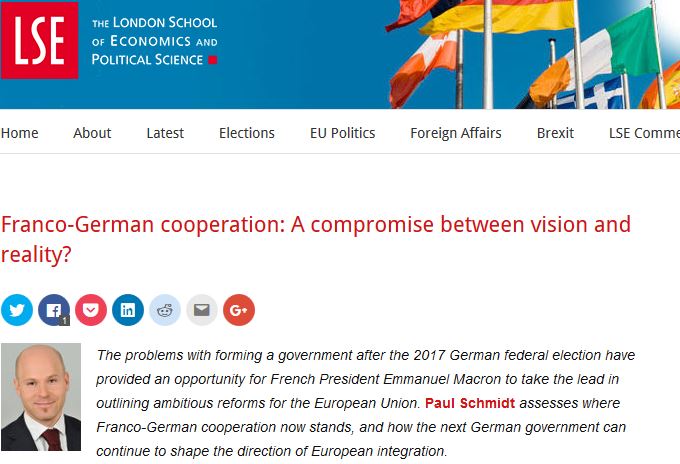Jean-Claude Juncker und Emmanuel Macron have both presented their reform proposals for a post-Brexit design of the European Union. The first wants to integrate the divergent views of all EU member states, the latter sketches new horizons rejecting any red lines. Berlin though remains silent. Since the beginning of the German election campaign last summer, it has not actively participated in the debate on the future of Europe. In the failed coalition negotiations between the German Conservatives, Greens and Liberals, the chapter on European affairs did not move beyond footnotes, while the latest consultations between the Conservatives and the Social Democrats at least outline a first response to recent French proposals.
Germany has managed the last decade of crisis quite well. The German economy is booming. Yet, Berlin has been criticised for not paying enough attention to the cross-border spillover effects of its policy-decisions and the detrimental developments in its European neighbourhood. It is perceived as being rather preoccupied with itself. In the European debate, Berlin has – for the time being – lost its pole position.
Today Paris is setting the pace and thus seriously limiting the strategic options for a new German federal government, which can either put its foot on the brake or try to reach pragmatic compromises on the basis of the reform proposals on the table. Macron, on the other hand, has restored the political weight of France, which in Europe at present fears no competition. The British voice will be lost and Spain as well as Italy are punching below their potential, still digesting the consequences of the financial and economic crisis. Macron raises expectations, which will need to be met. But he also inspires and gives hope to many Europeans while Merkel is likely to be cautiously entering her last period in government.
The ideas put forward by the French President are potentially contestable, and the implementation of these ideas could indeed produce further costs and raise the administrative burden. But the Élysée has succeeded in giving the sluggish European reform process a new momentum. Macron wisely fosters country alliances to deliver on his promises. In post-Brexit times, the Franco-German axis will play a particularly decisive role. European integration is based on their ability to build bridges and reach difficult compromises, which has always increased the potential for bringing other member states on board.
But now more than before Paris and Berlin will have to engage in dialogue to convince their European partners. Even without the UK, viewpoints heavily diverge and the different stages of societal development of the various EU-member states must be taken into account. Consensus building is becoming more complex as the Union reaches new levels of integration, impacting on various national competences. This includes areas such as the Economic and Monetary Union, limiting the room for independent fiscal policy, cross border challenges related to asylum and migration, as well as issues of social security and taxation policies. What is missing is a truly transnational debate on integration as well as the ability to activate the different actors of civil society. Here, the Franco-German tandem could be an important lever.
With their consultation paper, the likely to be new German coalition partners have shown their responsiveness to many of the French proposals. What do they agree on? Surprisingly, Berlin and Paris have already committed to increasing their financial contribution to the EU budget. At the same time, both agree to a more resolute enforcement of the principles and values of the EU. The two countries will also promote the social dimension of the Union – basic social rights and especially the principle of equal pay for equal work. They focus on competitiveness and investment as well as the fight against social and salary dumping.
Freedom of movement shall be fair and abusive immigration shall be prevented. Tax dumping, tax fraud and tax evasion shall be avoided and profits taxed where they are generated. Both demand a common, consolidated tax base, minimum tax standards for companies and a final decision on the implementation of a financial transaction tax. They want to improve the management of asylum and migration and stress their humanitarian responsibility. Fighting the root causes of migration, securing external borders, but also a shared responsibility within the Union are at the centre of their proposals. Their message is a rejection of protectionism, isolationism and nationalism and a particular focus on the next generation of Europeans, for instance through the expansion of educational youth exchanges.
While Macron promotes his vision of a multispeed and core Europe with the euro area as its centre, German voices warn against the risk of moving into entirely different directions of integration. The French President stresses the need to pool and share sovereignty in Europe and supports the idea of implementing transnational lists for the next elections to the European Parliament. But he avoids fresh ideas regarding a common foreign policy. He invokes multilateralism, but in the end does not mind unilateral action.
The fact that many of his ideas are being discussed in the various EU capitals proves that Macron leads the debate on the future of Europe. Yet, there are many divergent notions of where European integration should be going. If Germany was ready to take a clear stance, the chances would be good of bridging the gap between aspiration and reality.






